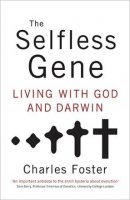 The Selfless Gene: Living with God and Darwin, by Charles Foster
(Thomas Nelson, Nashville, 2009)
The Selfless Gene: Living with God and Darwin, by Charles Foster
(Thomas Nelson, Nashville, 2009)
Charles Foster got one thing right: "The biologists will think that I have oversimplified the biology....Theologians will justifiably moan that I have summarized too brutally some very big and complex ideas." That's inevitable in a book that purports to bring sense to the evolution/creation debate, and might be forgivable for the extensive footnotes and bibliography, were the book not condescending as well.
Foster cries, "A plague on both your houses!" to young-earth creationists (a category which he unfortunately stretches to include nearly everyone with doubts about some parts of the evolutionary paradigm) and Richard Dawkins-style hyper-Darwinists, then sets forth his own solution to the problem. Unfortunately, his conclusions aren't as obvious or as logical as he would like to believe. After several chapters that needlessly insult creationists he shifts his aim to the hyper-Darwinists, following that with chapters that must have theologians scratching their heads. I can't decide if he's brilliant or merely heretical.
Nonetheless, The Selfless Gene is still a book worth reading. Foster is unafraid to tackle the important and perplexing questions that most people, especially those on the extremes of this debate, would rather ignore. And he's right that the extremes actually support and reinforce each other, increasing book sales while decreasing understanding. Whether or not Foster's ideas are right, they are at least thought-provoking, and might break a few mental log jams.
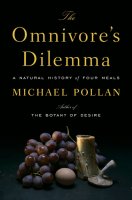 The Omnivore's Dilemma: A Natural History of Four Meals, by Michael Pollan (Penguin, New York, 2006)
The Omnivore's Dilemma: A Natural History of Four Meals, by Michael Pollan (Penguin, New York, 2006)
My limited knowledge of Michael Pollan prior to devouring this book was primarily his mantra for healthy eating: Eat food. Not too much. Mostly plants. There's a lot of wisdom there — not that I'm very good at following it — but that phrase itself is not found in The Omnivore's Dilemma. It is the beginning, however, of an excellent Pollan article in the New York Times, Unhappy Meals.
I'll admit I was expecting a diatribe, a full-force blast against agri-business and the factory farm, more along the lines of what we hear from the more strident vegans and animal rights activists. Pollan, however, is much too skilled as a journalist and writer for that. If his journeys lead him to both Food Hell and Food Heaven, they also show him that there is no clear, simple, and easy path to salvation when it comes to eating. (More)
 Mayflower: A Story of Courage, Community, and War, by Nathaniel Philbrick (Penguin, New York, 2006)
Mayflower: A Story of Courage, Community, and War, by Nathaniel Philbrick (Penguin, New York, 2006)
Whatever your preconceptions are of the Mayflower, its passengers, and the Native Americans whose lives were irrevocably altered by its arrival on their shores, Nathaniel Philbrick will change them. From the much-sanitized stories many of us older folks learned in elementary school, to the "politically correct" versions that sneer at the Pilgrims and idealize the Indians—forget them all. They're all partly true, but mostly false, and completely over-simplified. Both the Pilgrims and the Natives were better, and worse; more innocent, and more Machiavellian; wiser, and more foolish; more skillful, and more inept; than our visions of them. In short, they were all thoroughly human, and Mayflower's greatest strength lies in its ability to make these humans, European and Native American, as real to us as our next-door neighbors. (More)
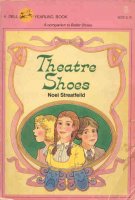 Theatre Shoes, by Noel Streatfeild (Dell, New York, 1983)
Theatre Shoes, by Noel Streatfeild (Dell, New York, 1983)
This wasn't on my reading list at this time, but the combination of (1) hearing a Teaching Company lecture about The Tempest and remembering the part it plays in this book, and (2) a dreary, chilly, rainy day in which the computer, the dryer, and the telephone all suddenly stopped working, led me to feel that what I needed was a bit of curling up by the heater with a blanket, a cup of tea, and an easy-to-read, uplifting book. (More)
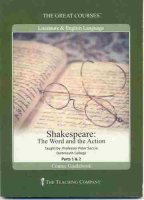
Shakespeare: The Word and the Action, by Peter Saccio; a Teaching Company lecture
For accessible, serious, high-quality, adult-level educational materials (DVD, tape, mp3 downloads) it's hard to beat The Teaching Company. Tonight we finished the last lecture of Shakespeare: The Word and the Action, a course which easily ranks as one of my favorites.
Here are the titles of the 16 lectures:
- Shakespeare's Wavelengths
- The Multiple Actions of A Midsummer Night's Dream
- The Form of Shakespeare's Sonnets
- Love in Shakespeare's Sonnets
- Love and Artifice in Love's Labor's Lost and Much Ado About Nothing
- As You Like It
- The Battles of Henry VI
- Richard III and the Renaissance
- History and Family in Henry IV
- Action in Hamlet
- Coriolanus—The Hero Alone
- Change in Antony and Cleopatra
- The Plot of Cymbeline
- Nature and Art in The Winter's Tale
- Three Kinds of Tempest
- History and Henry VIII
I find it easy to be intimidated by Shakespeare; despite the efforts of my high school teachers, the glories of the Bard didn't begin to open to me until a few months after my 50th birthday, when I saw Kenneth Branagh's version of Henry V.
Saccio's lectures aren't this inspiring, I will admit. But most of the plays he teaches I have never seen nor read, and every single lecture left both of us eager to experience the play, which is no small accomplishment. I highly recommend this course.

Eugenics and Other Evils: An Argument Against the Scientifically Organized State, by G. K. Chesterton. With Additional Articles by His Eugenic and Birth Control Opponents, including Francis Galton, C. W. Saleeby and Marie Stopes, as Well as Articles from Eugenics Review and Birth Control News. Edited by Michael W. Perry. (Inkling Books, Seattle, 2000)
In a day when our political views are more polarized than ever, and we tend to choose and judge what we read or watch by its political and social slant, there's a delightful keenness about a book that cannot be so classified. It is simultaneously far right and far left, which means nothing more than it is something else altogether. (More)
The latest version of Thunderbird, 3.01, includes a number of significant changes from Version 2. I think I'm going to like it, at least once the fix a major bug, which I understand they are working on. The old Thunderbird allowed the assignment of nicknames to e-mail addresses, so, for example, I could set up simple two-letter codes for people I write frequently, and typing those codes into the "To" field auto-completed the correct address. The new Thunderbird still allows nicknames, but they work differently: the named address becomes merely one of many suggestions made by the auto-complete engine, and it's rarely the first. Hence I, and from the word on the Internet, many others, have been embarrassed by sending e-mails to the wrong people. What's more, the auto-complete engine insists on searching all addresses for possible matches. I have three address books in Thunderbird: my Personal Address Book, one I call Archives, into which I put addresses I might want once in a blue moon, and one Thunderbird adds, called "Collected Addresses," which it populates from e-mails sent and received. All of these are useful, but I'd like to be able to tell Thunderbird to ignore all but the Personal Address Book.
Like Firefox, Thunderbird now uses tabs. In Firefox (and Internet Explorer) it's annoying, because the button to open a new tab is right next to the button to close the tab, and I'm forever closing tabs by accident and often losing work in the process. But Thunderbird doesn't have the "add tab" button to foul me up, and it's handy to be able to have several search results and a few e-mails all open in tabs. Thunderbird remembers what tabs you had open when you exited the program, and restore them when you open it again. (More)
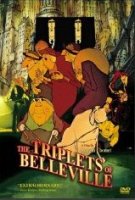
Les Triplettes de Belleville (2003, Sony Pictures, directed by Sylvain Chomet, PG-13)
Also known as The Triplets of Belleville, this is the quirky, sometimes funny, animated story of a bicycle racer, his grandmother, his dog, the French Mafia, and has-been singing trio. The award-winning film is meant for adults, but were it not for a couple of brief scenes (a music hall show, and some in-passing shots of prostitutes in the hallway), I think our six-year-old grandson would love it. (Hmmm, there is a funny part that might be tough for his frog-loving mother, however.)
We enjoyed it, too, though we found it a bit like a Presbyterian sermon: they could have said the same thing better in a third the time. Maybe that is just my American impatience.
I found it quite amusing that for such a very French film, the only language options available on the DVD Netflix sent were English and Spanish. Not that it matters: there's almost no dialog, and what there is, is inconsequential.
For some reason I haven't pinned down, the movie brought to mind the Asterix comics. Perhaps it was the French setting, perhaps something about the drawings, maybe something in the humor.
You can get a taste from the trailer: Les Triplettes de Belleville. (Link provided because some feedreaders don't pick up the embedded video.) The trailer is safe for granchild eyes, at least as far as Grandma can tell.
The good news is, there's a new orchestra in town: The Orlando Baroque Orchestra. Some area musicians observed Central Florida's lack of concerts featuring baroque music and stepped up to remedy the situation. We attended the third area performance of their first concert.
The venue was a small church, and we sat in the third pew. The experience of music in such an inimate setting is worlds different from that in a large concert hall, and to my mind significantly more enjoyable. It is not as much fun as making music yourself in a group, but comes closer. For this reason, I thoroughly enjoyed the concert, despite having numerous complaints, most of which had to do with disappointed expectations. But when your experience of baroque orchestras is Boston's Handel and Haydn Society; of lutists is Paul O'Dette; of harpsichordists is Kristian Bezuidenhout; and of oboists is, well, a whole host of marvellous performers; it's difficult not to set yourself up for a fall. (More)
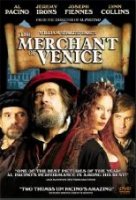 The Merchant of Venice (2004, Sony Pictures, directed by Michael Radford, R)
The Merchant of Venice (2004, Sony Pictures, directed by Michael Radford, R)
Not since Kenneth Branagh's Henry V and Much Ado about Nothing have I seen a movie that brings Shakespeare to life as does this version of The Merchant of Venice. I'm not familiar enough with the play to guess how much might have been left out, but as it stands, it is exceedingly well crafted and acted. Unique to this performance is the empathy I felt with all the characters; all are portrayed with a depth of humanity that made me care about what happened to them. The play is funny, tragic, poignant, and memorable.
The R rating is not as bad as might be: sexual suggestiveness that would go over the head of anyone I'd worry about, and some brief nudity that wouldn't. It's a pity movie makers don't think about children when they produce Shakespeare; the elements that keep me from recommending this to our grandchildren are not at all necessary for the film. Children can get value from the rest of a book, play, or movie while remaining oblivious to descriptions that adults can fully understand and appreciate without explicit portrayal.
Carl Maria von Weber: Ruler of the Spirits, J.109, op. 26, E-flat major
Schubert: Symphony No. 9 D.944 in C major, The Great C major
Beethoven: Violin Concerto, op.61, D major
I deplore much of the current "superstar" movement, be it in music, academia, sports, business, or elsewhere: the astronomical pay scale and near-idolatrous attention given to the very few, to the detriment of the field as a whole. That did not, however, stop me from enjoying Itzhak Perlman's performance of the Beethoven. The OPO's own Aaron Goldman* can put on a show at least as exciting and excellent as James Galway's, but much as I respect most of our string players, the difference in Perlman's playing was striking. And there's no doubt he draws a crowd: the concert was sold out.
 Food, Inc. (2008, Magnolia Home Entertainment, directed by Robert Kenner, PG )
Food, Inc. (2008, Magnolia Home Entertainment, directed by Robert Kenner, PG )
I first heard about Food, Inc. seven months ago, and at that time posted the trailer, a couple of links, and my determination to see the movie when it became available on Netflix. Just before Christmas the disk arrived in our mailbox, so we packed it in our luggage and were able to enjoy it with my brother and his family, which was only fitting, as they are the ones who alerted us to the movie in the first place.
Everyone who eats should see this film. Alas, it only touches the surface of the problems in our food industry and doesn't have time to say much about solutions—but it's quite enough to inspire further research. The film's website might be a good place to begin.
 It Happened in Italy: Untold Stories of How the People of Italy Defied the Horrors of the Holocaust, by Elizabeth Bettina (Thomas Nelson, Nashville, 2009)
It Happened in Italy: Untold Stories of How the People of Italy Defied the Horrors of the Holocaust, by Elizabeth Bettina (Thomas Nelson, Nashville, 2009)
Imagine: You are suddenly torn away from your home and possessions and are removed with others of your kind to a place where you must check in daily with the police and obey a strict curfew. You can't leave, practice your profession, carry anything that might be used as a weapon, visit a bar, or attend any meeting or any form of entertainment. You are imprisoned there for years, and yet for the rest of your life you will be passionately grateful to your captors and will remember your incarceration as pleasant. You are a Jew during World War II, sent to a concentration camp—in Italy.
Elizabeth Bettina, a third-generation Italian Catholic from New York City couldn't get over the picture: Taken in the 1940's of a gathering on the steps of the church where her grandparents were married, in the tiny, Catholic town of Campagna, the snapshot clearly included a priest, a police officer, and a rabbi. A rabbi? Bettina's research into the unmentioned history of her grandmother's hometown reveals a surprising tale of ordinary goodness in a time of extraordinary evil. (More)
One who makes a practice of passing written judgement on books would do well to reveal at least some of the background and prejudices that go into those judgements, so I will make a brief attempt at so doing. Whether or not I like a book is determined by many factors, not all of which I know myself.
I'm a writer—if you can say that of one whose paid, professional writing experiences ended several decades ago—so I like well-written books. I like good grammar, correct spelling, and well-organized paragraphs. I like coherent ideas presented logically and accurately.
I'm reasonably intelligent and well-educated, so I do not like being talked down to. I don't like books that assume I have the vocabulary and attention span of an average fourth grader. I especially don't like folksy books that sound like conversation. That's great for blogs, Facebook, and Twitter, but if an idea is worth putting ink to paper, it's worth a more serious, careful treatment. (More)
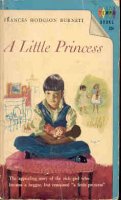 A Little Princess, by Frances Hodgson Burnett (Grosset & Dunlap, New York, 1965)
A Little Princess, by Frances Hodgson Burnett (Grosset & Dunlap, New York, 1965)
I picked this book up to re-read it because I needed an antidote to The Curious Incident of the Dog in the Night-Time. You can tell this particular copy has been in my library for a long time by the printing date above. The price on the book is 50 cents. The book itself was written in 1904, and can be found online.
Burnett's characters are as one-dimensional as most of Haddon's, and her heroine is a little too good to be completely believable. But "a man's reach should exceed his grasp, or what's a heaven for?" and the question of how much of our good behavior is merely a response to pleasant circumstances is by no means a shallow one. A friend of ours has a daughter who is very much enthralled by the Disney Princesses, an infatuation her mother wisely turns to a learning opportunity, reminding her as often as necessary that princess is as princess does. This is the theme that runs through A Little Princess, as Sara, sneeringly dubbed "princess" for her wealth and spoiled childhood, has her character tried through hardship. If the ending of The Curious Incident was unsatisfactory, that of A Little Princess is definitely contrived and coincidental—but at least it's fun. The book also wins points by making me wish to be a better person, an idea I'll return to in a subsequent post.

